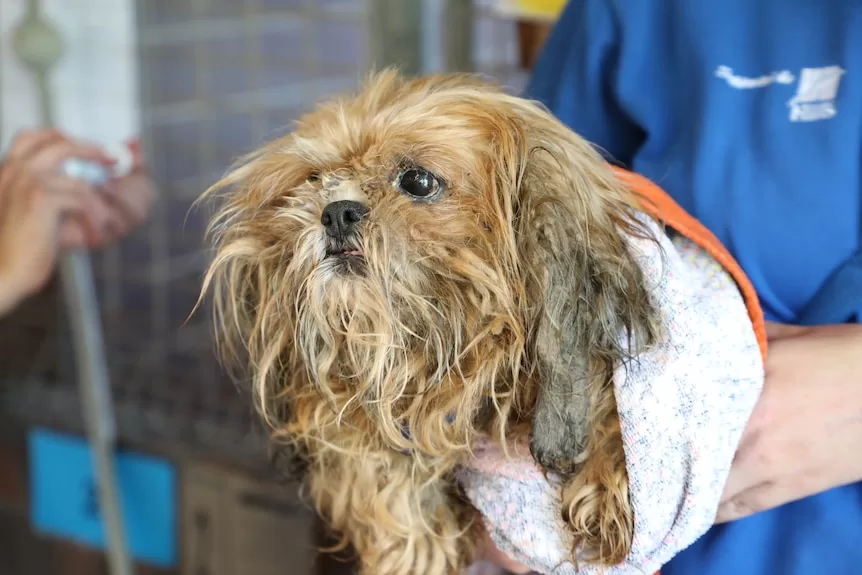- In short: Two women have been convicted of animal welfare offences after more than 100 animals were found “living in squalor” in SA.
- The RSPCA said three seriously ill animals had to be euthanised because they were suffering from “multiple” health conditions.
- What’s next? The women received a suspended jail sentence and were ordered to not own more than one companion animal each.
South Australian animal welfare authorities say a recent case of “horrific” and “indiscriminate animal breeding and hoarding” highlights the need for stronger animal protection laws.
The RSPCA has released images of more than 100 animals it said were “living in squalor” before they were seized from a property in SA’s Mid North.
Dogs, puppies, cats, kittens, native birds, possums and a bettong were among the animals seized, according to the RSPCA.
The organisation said three seriously ill animals — two dogs and the bettong — had to be euthanised because they were suffering from “multiple” health conditions.
The RSPCA said its inspectors first responded to a cruelty report on November 3, 2020, where they discovered dogs, caged cats and native animals living among rubbish, faeces and ammonia in a house without electricity.
“Encrusted and hardened dirt, faeces and hair covered all floors. Dirt extended up walls and over benchtops and heavy cobwebs hung from the ceilings,” the RSPCA said in a statement.
In one area of the property, inspectors found 11 kangaroos, one with a deformed leg that had been broken, the RSPCA said.
Animals treated for infections, matted fur
At the first inspection, more than 60 dogs, 11 cats and kittens, a possum, a bettong, a wattle bird and magpie were seized from the property and examined by vets over two days.
The RSPCA said 32 dogs had severe dental disease with “purulent discharge” and required teeth extraction, while some dogs had all teeth removed.
One dog required the partial removal of its jaw, another had an eye removed because of a corneal ulcer caused by long hair growing in its eyes and another had a leg amputated.
The other animals were treated for conditions including severe ear infections, matted fur and overgrown nails, according to the RSPCA.
The organisation said of the 11 cats seized, three had severe dental disease and one had an ear infection.
RSPCA inspectors said they returned to the property a second time on November 10, 2020 with SA Police where they found a large number of animals with health issues.
They found a goat with a broken leg, a mule with a large distended stomach, a brushtail possum confined to a wooden box and turtles housed in small tanks with no access to dry areas.
On that occasion, inspectors seized more than 20 dogs, two possums, two galahs and a corella from the property.
The RSPCA said the cost of treating and caring for the animals was $46,000.
RSPCA calls for tougher welfare laws
On Tuesday, the women pleaded guilty in the Elizabeth Magistrates Court to 11 charges of animal ill-treatment under the Animal Welfare Act.
The pair received a three month and 18 day suspended jail sentence and were placed on a two year $500 good behaviour bond.
Magistrate Edward Stratton-Smith ordered the women to not own more than one companion animal each.
“The case highlights not only the failure of SA’s breeder regulations to stop low-welfare operators, but also the need for a legal reform that RSPCA SA hopes to see introduced when the current review of SA’s Animal Welfare Act is completed,” the RSPCA said in a statement.
“If successful, the reform would end the requirement to successfully prosecute animal hoarders to obtain animal ownership prohibition orders.”
RSPCA SA chief inspector Andrew Baker said it was one of the most extreme cases of animal hoarding the organisation had dealt with.
“These defendants were registered breeders and had previously supplied puppies to pet shops,” Mr Baker said in the RSPCA statement.
A spokesperson for Environment Minister Susan Close said the state government was reviewing the Animal Welfare Act to ensure laws stay up-to-date with community expectations.
“Proposals include strengthening the existing legislation to provide tougher penalties for people who harm animals,” the spokesperson said.
“The government is also considering introducing interim orders to ban people from owning an animal while awaiting trial for animal cruelty offences.”
